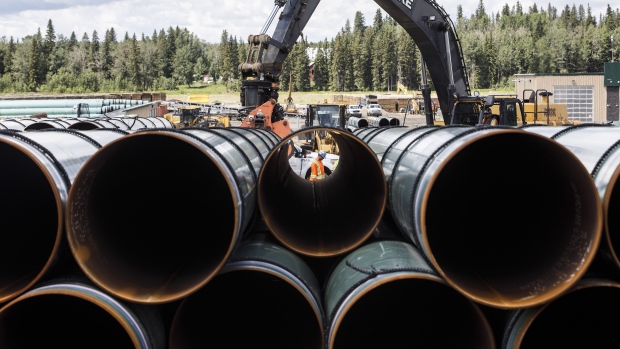OTTAWA —
Expanding the Trans Mountain pipeline will now cost at least $12.6 billion — up from a three-year-old estimate of $7.4 billion on a project Finance Minister Bill Morneau insisted the Liberal government intends to sell back to the private sector and recoup taxpayers’ investment.
Speaking to reporters in Ottawa, Morneau said the cost was “in the range of the considerations” the government looked at when it purchased the project two summers ago to ensure it would be built.
“The project will deliver $1.5 billion of available cash flow once it’s finished, which means it remains commercially viable and, I think, very interesting for the eventual commercial buyers that we’re going to be seeking, because we don’t intend on keeping this in government hands,” he said Friday.
Trans Mountain Corp., the federally owned company managing the project, has spent $2.5 billion, leaving an additional $8.4 billion needed to complete work, plus $1.7 billion of carrying costs.
Ottawa is also being told to set aside an extra $600 million in reserve to cover unforeseen expenses.
The company’s president said the increase was split between delays and design changes, such as adding thicker pipe in some areas and enhanced leak-detection provisions. Ian Anderson also said the project is expected to be in service by December 2022.
He said the project today is not what was originally unveiled in 2012, nor when the last cost estimate was released in 2017 by Houston-based Kinder Morgan, Inc. It is also different than what Ottawa envisioned in 2018 when it bought the pipeline for $4.5 billion.
At the time, the company said political risk that the project would never get built was too much to bear and was planning to halt the expansion when the Liberals came in to buy it, reduce the risk and make it attractive for another buyer.
Morneau also attributed the change in price to safety and design changes to reach a higher environmental standard, as well as higher labour costs and consultations with Indigenous communities, who he said Ottawa wants to benefit from the project, potentially as a buyer.
Should the federal government now be unable to sell the pipeline as planned, the total cost to federal taxpayers to buy and build the project would be $17.1 billion — a cost the Liberals defended as necessary to get Canadian oil to new markets beyond the United States, and use the revenues to fund a transition to a low-carbon economy.
Alberta Environment Minister Jason Nixon suggested a backstop of $2 billion promised by the previous provincial NDP government was not on the table.
“We see this as the federal government’s responsibility,” he said. “We’re in this situation because of their political failure and we expect them to get the job done that they’ve promised Albertans.”
Critics have attacked the project’s greenhouse-gas emission and oil-spill risks, and charged it will be a money-loser because of unproved markets in Asia — making Trans Mountain fail financially and leave the public holding the bag.
Opposition parties have blamed the Liberals for their handling of the energy file and the project itself for its current situation.
“This should get back in the hands of the private sector immediately so that not a single tax dollar is spent to build this pipeline,” Conservative natural resources critic Shannon Stubbs said.
Sven Biggs, climate and energy campaigner for Stand.earth, argued the total cost could make it impossible for Ottawa to sell it to a new owner, saying it was time to “hit the pause button and reconsider whether or not you’re still getting value for the taxpayer.”
The higher capital costs for construction mean a lower valuation of the pipeline when it comes time to sell it, which could result in a lower rate of return for taxpayers or a loss for Ottawa, said Richard Masson, senior fellow at the University of Calgary’s School of Public Policy.
He said the cost increase will also mean higher shipping tolls for producers, and a lower payback for their oil.
“That means less taxable income and less royalties. Less cash flow means less jobs and investment. So it has that compounding effect” on the economy, he said.
Anderson said the pipeline will be a money-maker “every day through its contractual period of 20 years.” He pointed out 80 per cent of the space on the pipeline is contracted to 13 clients, including domestic oilsands producers like Suncor Energy Inc. and Canadian Natural Resources Ltd., as well as international firms such as Total S.A. and a subsidiary of PetroChina.
Opponents of the pipeline expansion have vowed to do whatever it takes to stop the project despite losing a legal challenge before the Federal Court of Appeal this week. The four First Nations who lost the court challenge on Tuesday have 60 days to appeal to the Supreme Court of Canada.
The expansion project would triple the capacity of the existing pipeline between Edmonton and a shipping terminal in Burnaby, B.C. to about 890,000 barrels per day of diluted bitumen, lighter crudes and refined products.
New Democrat MP Peter Julian, who represents a Burnaby-area riding, said the Liberals shouldn’t bankroll the expansion if they claim to be champions of the environment.
“There’s already a pipeline … that would be maintained, but the idea that we spend on top of that another $13 billion in construction when it is extremely controversial does not make sense,” he said.
In a statement, Tim McMillan, president of the Canadian Association of Petroleum Producers, said the project carried “substantial long-term benefits” and included “significant accommodations to Indigenous communities.”
Chris Bloomer, chief executive of the Canadian Energy Pipeline Association, said Trans Mountain’s long road to construction should help future projects better navigate the regulatory process.
“That’s going to lead to certainty, and timing of things is critically important to get these projects initiated and built.”
This report by The Canadian Press was first published Feb. 7, 2020.
With files from Lauren Krugel
Source link
Related






























